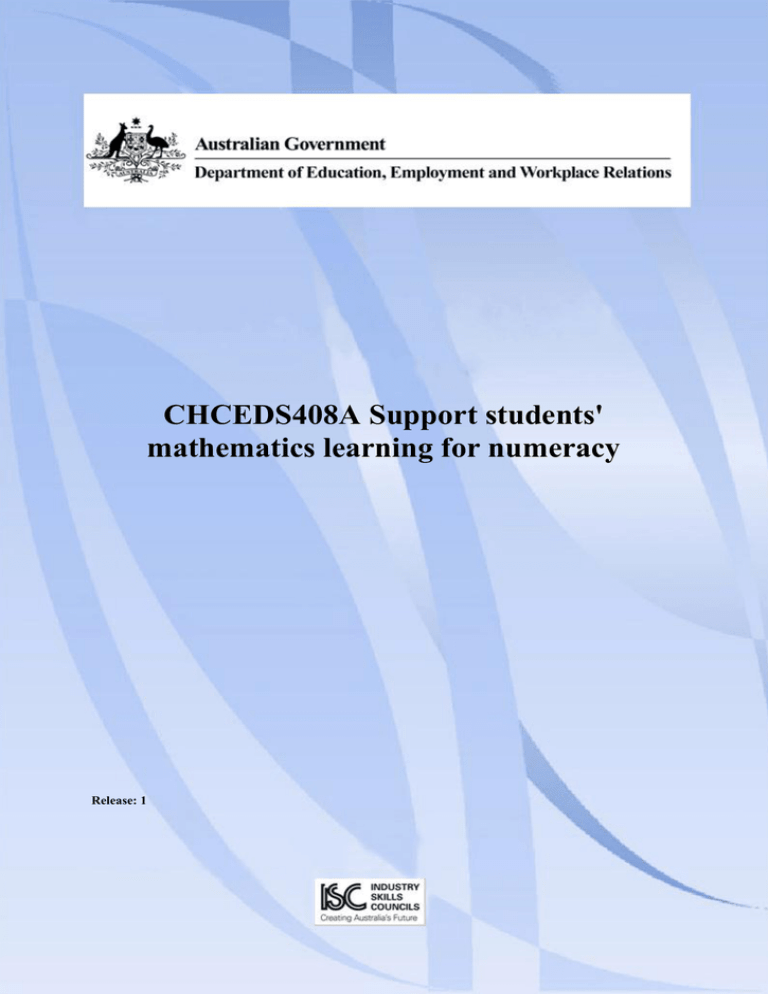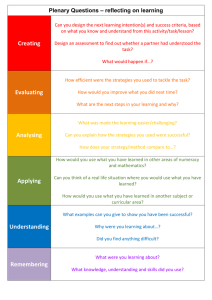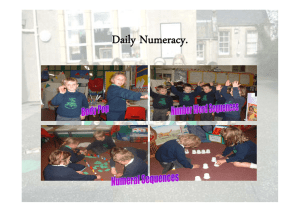CHCEDS408A Support students` mathematics learning for numeracy
advertisement

CHCEDS408A Support students' mathematics learning for numeracy Release: 1 CHCEDS408A Support students' mathematics learning for numeracy Date this document was generated: 27 May 2012 CHCEDS408A Support students' mathematics learning for numeracy Modification History Not Applicable Unit Descriptor Descriptor This unit describes the skills and knowledge required by education support workers to work with teachers to support students developing their mathematics skills for numeracy, including using number, measurement, estimation and problem solving The unit provides skills and knowledge to enable education support workers to work with the teacher to develop resources to reinforce mathematics skills for numeracy across the curriculum and to support students during various phases in the acquisition of numeracy competence Application of the Unit Application This unit applies to education support work in a variety of contexts and work is to be undertaken with appropriate guidance, support and supervision by a nominated teacher or other education professional Licensing/Regulatory Information Not Applicable Pre-Requisites Not Applicable Approved © Commonwealth of Australia, 2012 Page 2 of 12 Community Services and Health Industry Skills Council CHCEDS408A Support students' mathematics learning for numeracy Date this document was generated: 27 May 2012 Employability Skills Information Employability Skills This unit contains Employability Skills Elements and Performance Criteria Pre-Content Elements define the essential outcomes of a unit of competency. The Performance Criteria specify the level of performance required to demonstrate achievement of the Element. Terms in italics are elaborated in the Range Statement. Elements and Performance Criteria ELEMENT PERFORMANCE CRITERIA 1. Facilitate application of mathematics skills for numeracy 1.1 Identify and explain a variety of numeracy demands and opportunities in daily life 1.2 Demonstrate the different functions of mathematics using activities and examples 1.3 Monitor students' understanding and use of mathematics through observation, listening and conversation, and provide information to teachers to inform planning 1.4 Identify factors affecting acquisition of mathematics skills for numeracy and discuss with the teacher/s 1.5 Develop numerate understandings appropriate to students' culture, age, abilities, interests and needs 1.6 Use examples and activities to highlight and explain applications of mathematics for numeracy to scaffold learning 1.7 Model use of mathematics skills appropriate to a range of life and workplace situations relevant to specific students Approved © Commonwealth of Australia, 2012 Page 3 of 12 Community Services and Health Industry Skills Council CHCEDS408A Support students' mathematics learning for numeracy Date this document was generated: 27 May 2012 ELEMENT PERFORMANCE CRITERIA 2. Support students to develop mathematics skills for numerate understanding 2.1 Determine strategies for supporting students in the application of mathematics skills for numeracy in consultation with the teacher/s 2.2 Implement planned strategies to enhance the abilities of students and address their individual needs 2.3 Encourage students to problem-solve using mathematics knowledge and skills in everyday life contexts 2.4 Use explicit talk to focus students on specific mathematics knowledge and skills to be numerate 3. Enhance students' mathematics knowledge and skills through structured activities 3.1 Use accurate mathematics terminology and concepts, as planned with teacher/s, to support students' learning 3.2 Implement strategies devised with teacher/s to develop students' skills in the use of mathematics for numeracy understanding 3.3 Use planned strategies to engage students in identifying mathematical knowledge and skills for numeracy across all key learning areas 3.4 Encourage students to improve mental computation and calculation skills using strategies appropriate to students' developmental levels 3.5 Ensure students check for reasonableness of solutions when calculating, using a range of strategies including estimating and technology 3.6 Encourage students and build their confidence to attempt problem solving that requires the use of mathematics knowledge and skills Approved © Commonwealth of Australia, 2012 Page 4 of 12 Community Services and Health Industry Skills Council CHCEDS408A Support students' mathematics learning for numeracy Date this document was generated: 27 May 2012 ELEMENT PERFORMANCE CRITERIA 4. Design resources to support mathematics learning for numeracy 4.1 Plan learning environments and activities in advance with the teacher/s 4.2 Design resources, in consultation with teacher/s, to reinforce mathematical knowledge and skills, while fulfilling curriculum requirements 4.3 Design resources to suit the developmental level of the students, as determined by the teacher/s Approved © Commonwealth of Australia, 2012 Page 5 of 12 Community Services and Health Industry Skills Council CHCEDS408A Support students' mathematics learning for numeracy Date this document was generated: 27 May 2012 Required Skills and Knowledge REQUIRED SKILLS AND KNOWLEDGE This describes the essential skills and knowledge and their level required for this unit. Essential knowledge: The candidate must be able to demonstrate essential knowledge required to effectively do the task outlined in elements and performance criteria of this unit, manage the task and manage contingencies in the context of the identified work role These include knowledge and understanding of: Mathematical knowledge and skills appropriate to the students being supported The differences between the roles and responsibilities of teachers and education support workers Mathematical concepts and operations relevant to the year levels and the needs of students Language associated with mathematics and numeracy as used by supervising teacher/s Questions to encourage critical thinking about mathematics and its use as a learning tool Policy, procedure and legislative issues affecting performance as education support workers The role of education support personnel in implementing planned mathematics activities with students A range of basic communication strategies Questioning techniques that scaffold learning and assist students to problem-solve Essential skills: It is critical that the candidate demonstrate the ability to: Collaborate with teacher to analyse student needs in relation to development of numeracy understanding and apply an appropriate model of learning to develop the student's mathematics knowledge and skills Implement support strategies appropriate to the year level in collaboration with the teacher Implement programs that support a range of students who may be at various levels in collaboration with the teacher Maintain and complete workplace records Adapt examples and activities to meet the specific needs in mathematics knowledge and Approved © Commonwealth of Australia, 2012 Page 6 of 12 Community Services and Health Industry Skills Council CHCEDS408A Support students' mathematics learning for numeracy Date this document was generated: 27 May 2012 REQUIRED SKILLS AND KNOWLEDGE understanding of individual students Apply knowledge of stages of development in mathematics knowledge and skills Use specific strategies to scaffold student learning as directed by a teacher Use a range of strategies to support students with the acquisition of mathematics skills and knowledge In addition, the candidate must be able to effectively do the task outlined in elements and performance criteria of this unit, manage the task and manage contingencies in the context of the identified work role These include the ability to demonstrate application of skills in: Application of mathematical concepts applicable to the year levels in which they operate, i.e. early childhood, primary, secondary Identification, collation and development of resources to support development of mathematics skills and knowledge for numeracy Effective interpersonal communication (e.g. active listening, giving clear directions and/or instructions, expressing an opinion, suggesting improvements to strategy/methods for assisting/supporting students and teachers Time management to provide support to learners as guided by teachers Consulting with the teaching team and other education support workers on workplace procedures and new approaches to accommodate individual student requirements Problem-solving and scaffolding problem-solving Initiative - to use appropriate support strategies when opportunities arise and to inform teachers of student abilities Evidence Guide EVIDENCE GUIDE The evidence guide provides advice on assessment and must be read in conjunction with the Performance Criteria, Required Skills and Knowledge, the Range Statement and the Assessment Guidelines for this Training Package. Critical aspects for assessment and evidence required to demonstrate this unit of Approved © Commonwealth of Australia, 2012 The individual being assessed must provide evidence of specified essential knowledge as well as skills This unit may be assessed either on the job or off the Page 7 of 12 Community Services and Health Industry Skills Council CHCEDS408A Support students' mathematics learning for numeracy Date this document was generated: 27 May 2012 EVIDENCE GUIDE competency: Access and equity considerations: Context of and specific resources for assessment: Approved © Commonwealth of Australia, 2012 job through an appropriate workplace simulation Assessment should ensure the candidate addresses the elements and performance criteria on at least three occasions, over a period of time All workers in community services should be aware of access, equity and human rights issues in relation to their own area of work All workers should develop their ability to work in a culturally diverse environment In recognition of particular issues facing Aboriginal and Torres Strait Islander communities, workers should be aware of cultural, historical and current issues impacting on Aboriginal and Torres Strait Islander people Assessors and trainers must take into account relevant access and equity issues, in particular relating to factors impacting on Aboriginal and/or Torres Strait Islander clients and communities This unit can be assessed independently, however holistic assessment practice with other community services units of competency is encouraged Assessment requires access to a range of opportunities defined in the Range Statement, including access to: an educational work environment or simulation of realistic work environment to enable candidates to demonstrate their knowledge and skills while working with teachers and students mathematics and numeracy terminology used in the educational organisation Page 8 of 12 Community Services and Health Industry Skills Council CHCEDS408A Support students' mathematics learning for numeracy Date this document was generated: 27 May 2012 EVIDENCE GUIDE Method of assessment: Assessment methods suitable for valid and reliable assessment of this competency may include, but are not limited to, a combination of two or more of: case studies demonstration observation questioning - oral and written scenarios, simulation or role plays workplace projects authenticated evidence from the workplace and/or training courses Assessment methods should reflect work demands, such as literacy, and the needs of particular groups, such as: people in rural and remote locations people with disabilities people from culturally and linguistically diverse backgrounds Aboriginal and Torres Strait Islander people women young people older people Range Statement RANGE STATEMENT The Range Statement relates to the unit of competency as a whole. It allows for different work environments and situations that may affect performance. Add any essential operating conditions that may be present with training and assessment depending on the work situation, needs of the candidate, accessibility of the item, and local industry and regional contexts. Approved © Commonwealth of Australia, 2012 Page 9 of 12 Community Services and Health Industry Skills Council CHCEDS408A Support students' mathematics learning for numeracy Date this document was generated: 27 May 2012 RANGE STATEMENT Applications of mathematics knowledge and skills for numeracy may include: Using mathematics in real life contexts: Factors affecting acquisition of mathematics skills for numeracy may include: Scaffold learning involves providing temporary support to students to enable their progress toward independent thinking and learning It may include: Approved © Commonwealth of Australia, 2012 Operations and calculations Measurement of area, volume, length etc Reading and interpreting data displays Catering Ordering Reading maps, driving, navigating Timetables and timelines Planning use of spaces Explore situations with money Working mathematically to solve problems Limited opportunities for practice Health issues Socioeconomic issues Home language other than English Relating new knowledge to student's current knowledge Breaking new information into smaller chunks Approaching new information in a familiar way or by referring to known information Encouraging students to concentrate on new information through the use of concrete or real life materials Providing achievable challenges with opportunities for thinking and reasoning mathematically Encouraging students to communicate their mathematical thinking both orally and written Recognising and encouraging attempts to use new information Encouraging repeated use of information to achieve automaticity in mental computation Page 10 of 12 Community Services and Health Industry Skills Council CHCEDS408A Support students' mathematics learning for numeracy Date this document was generated: 27 May 2012 RANGE STATEMENT Encourage students to problem-solve by: Accurate mathematics terminology and concepts may include: Strategies to develop students' confidence and positive attitude to use their mathematical knowledge and skills (for numeracy) may include: Approved © Commonwealth of Australia, 2012 Modelling problem-solving strategies aloud (talking the talk) Accepting and valuing students' attempts to solve problems Encouraging self-help Using open ended questioning Referring to similar problems and how they were solved Encouraging risk-taking Allowing sufficient thinking time (wait time) Not interrupting the child's reading Offering support which provides least support first, and moving to most support only if required Vocabulary - mathematics context versus real world contexts Symbols Displays (graphs, tables etc) Units of measurement Mathematics specific conventions Hands on activities Activities for real life purposes Using technologies Active engagement in learning Creative problem solving activities Investigations and open ended questions Opportunities to pose and solve questions Page 11 of 12 Community Services and Health Industry Skills Council CHCEDS408A Support students' mathematics learning for numeracy Date this document was generated: 27 May 2012 RANGE STATEMENT Learning environments may include: Use of a variety of spaces to indicate mathematics is evident everywhere and across all learning areas: Resources may include: Classrooms Libraries Laboratories Outdoor areas Community spaces Art areas Parks and gardens Charts Posters Games Concrete materials Handouts Displays Labels Workbooks Reference materials Online and digital resources Unit Sector(s) Not Applicable Approved © Commonwealth of Australia, 2012 Page 12 of 12 Community Services and Health Industry Skills Council

